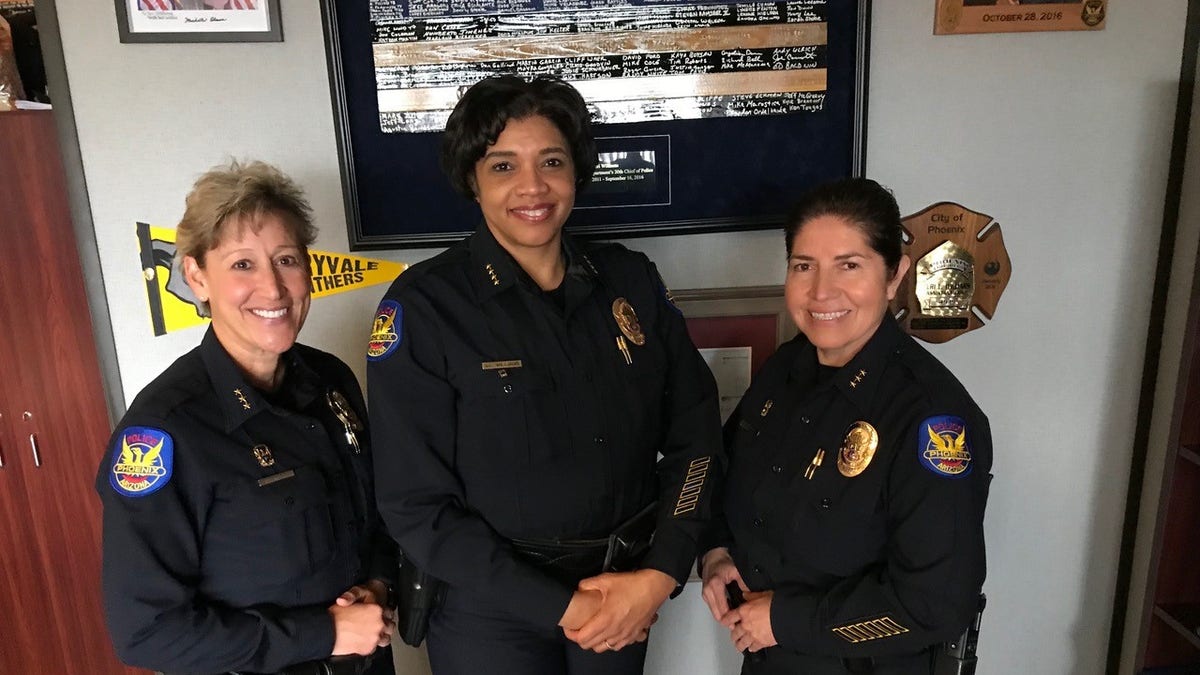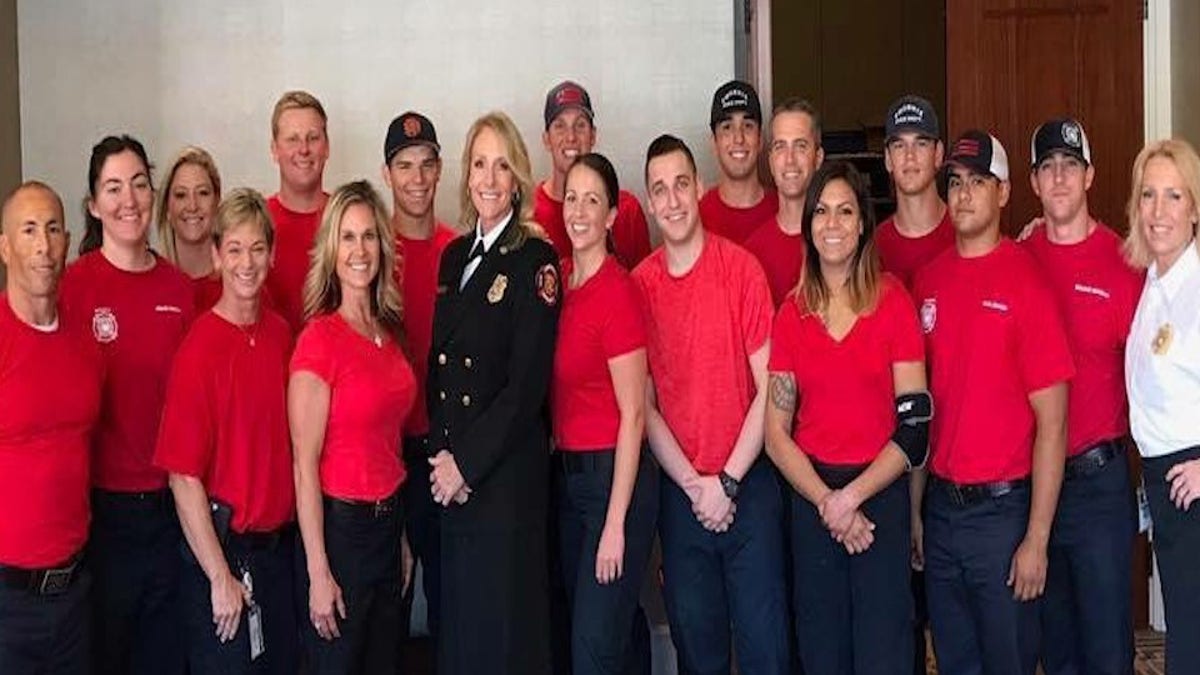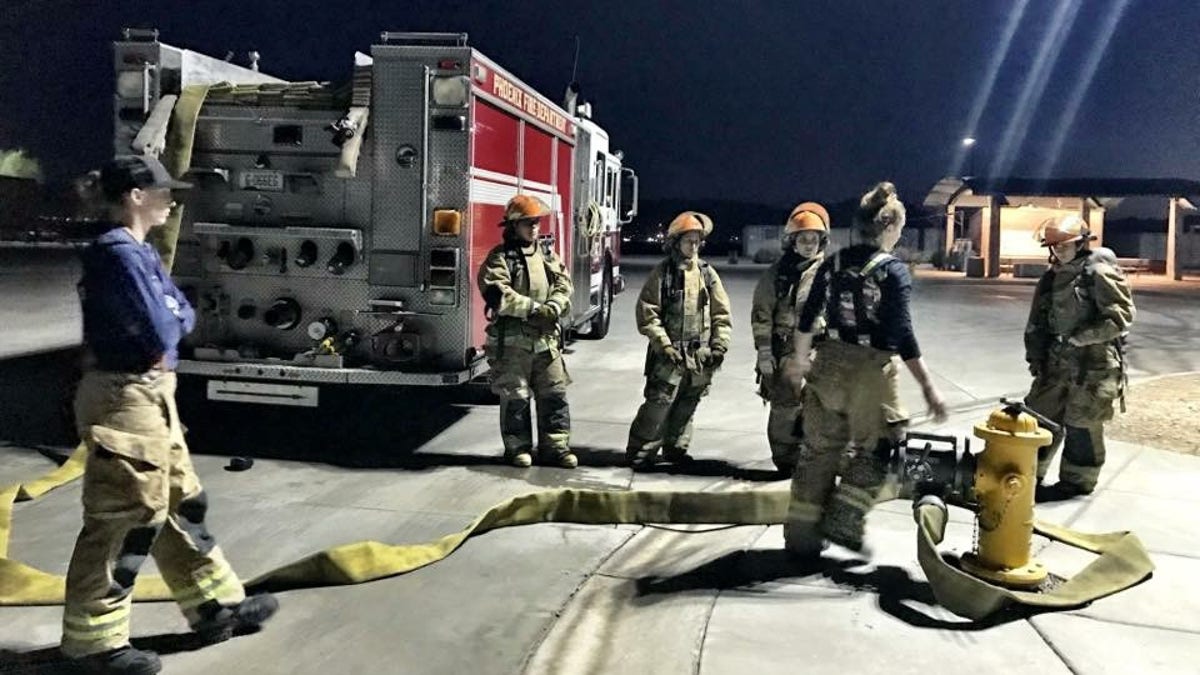Women have made major strides in many male-dominated professions. But two fields that remain male-led bastions are police and fire departments.
One rare exception is Phoenix, the only major city in the U.S. where women serve at the helm of both those departments.
Phoenix Police Chief Jeri Williams was hired in 2016 and Phoenix Fire Chief Kara Kalkbrenner was hired in 2013.
The women who rule Phoenix say their gender had nothing to do with why they were chosen to lead.
“We always say we were picked because of our leadership ability and I just happened to be female,” Chief Williams said.
“We always say we were picked because of our leadership ability and I just happened to be female"
But they are not the only public safety departments with women leaders. In Phoenix, women also lead the city’s homeland security, emergency management departments, and prosecutor’s office.

"A major city finally got a female police chief-this is huge," Assistant Chief Sandra Renteria said. "It took a while to get there.” (L-R) Assistant Chief Mary Roberts, Chief Jeri Williams, Assistant Chief Renteria (Fox News)

Phoenix Fire Chief Kara Kalkbrenner has 75 women in the fire department, including Captain Riddle-Bigler, who’s in line to become a battalion chief (Phoenix Fire Department)
The city is breaking away from the national trend of having men dominate leadership roles. Women in Phoenix say that what makes the city so unique is that they have broken down the stereotypes that have hindered women in the past, and the mentality in the city is that women can do anything a man can.
“When I came on in the ‘80s, there were some unique challenges,” Phoenix Police Assistant Chief Mary Roberts said. “It was a very small amount of women on the department at that time and they quickly sized you up: ‘Are you going to be a stereotypical girl on the police department? Are you going to cry? Are you going to be scared? Are you physically fit enough to be able to handle (a) situation that we are often put in?’”
But she said women in the city quickly proved they could rise to the challenge.
"They quickly sized you up. ‘Are you going to be a stereotypical girl on the police department? Are you going to cry? Are you going to be scared? Are you physically fit enough... So, those challenges are there. But…you rise to those challenges.”
Those stereotypes still exist but are now a rare sentiment rather than the norm.
“I think that nowadays, it’s just becoming more common nature—you don’t see as many barriers, it’s not really a topic of discussion,” Phoenix Fire Capt. Reda Riddle-Bigler said. “I don’t really believe it’s something that we talk about in the fire department. As a female on the job and those that I mentor, what we do talk about is carrying your own weight, doing what’s asked of you and being able to do the job just as any other man would be able to do.”
While the number of male police officers nationwide far outpace female cops, the two city leaders are seeking to reverse the trend, locally. And their leadership is making an impact.
In 2016, almost 88 percent of full-time law enforcement officers were males. In 2013, 88 percent of full-time law enforcement officers were males, according to the FBI. In firefighting, the national annual average of female firefighters was 4.6 percent, according to the National Fire Protection Association.
At the Phoenix fire department, there are 75 women, including Riddle-Bigler, who’s in line to become a battalion chief and helps recruit women firefighters and mentors girls at camps as early as the age of 12.

“When you’re riding on big red and you’re going on calls, being a woman on the call you bring a whole different element,” Captain Riddle-Bigler said. (Phoenix Fire Department)
Riddle-Bigler said Kalkbrenner and Williams are breaking the glass ceiling in ways no one thought was possible – and in professions that have historically been largely dominated by men.
“Their strength and ability to run these large departments in such a respected position, it definitely paves the way for us,” Riddle-Bigler said. “Makes you know that there is hope. That you, too, can do it. And really, just how to be a leader. Be so good that they can’t ignore you.”
Plus, some say, it pays to have more women in the police force.
A study done by the National Center for Women and Policing found that female officers are less likely to use excessive force, will improve law enforcement’s response to violence against women, implement community-oriented policing, and that, with an increase presence of female officers, it reduces problems of sex discrimination and harassment within a law enforcement agency.
“Do we make a difference?” Williams asked. “Yes. We make that difference because we look different than other people – but I never want to diminish the value of the time we’ve put in to our craft. The continuous training, the continuous studying. I think the connection to the community is that it’s sometimes easier to approach me because I look like your mom or someone in the community. So, I think the approachability factor is different and, I think, an added benefit.”
Riddle-Bigler said it also helps with female victims.
"I just think it opens it up and...allows the younger women out there to see women in leadership roles that it’s something that they can do if that’s something they aspire to do.”
“When you’re riding on big red and you’re going on calls, being a woman on the call you bring a whole different element,” Riddle-Bigler said. “You can handle calls that maybe the call is domestic violence, rape, something that’s very personal—but having another female next to her can help coach her through something. So, I think we bring something unique, in that respect.”
Phoenix did not seem set out to be a national model for female parity. But Williams said it shows naysayers out there that women can, and have, overseen police and fire departments effectively.
“It can be done,” Chief Williams said. “Regardless of what that is, don’t let obstacles stay in your way. Just keep moving forward until you find what you’re passionate about. Had I stopped every time someone said I couldn’t do something, heck I wouldn’t have been a police officer, let alone a police chief, twice. So, it can be done.”

